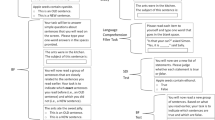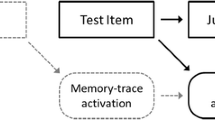Abstract
Marginal knowledge refers to knowledge that is stored in memory, but is not accessible at a given moment. For example, one might struggle to remember who wrote The Call of the Wild, even if that knowledge is stored in memory. Knowing how best to stabilize access to marginal knowledge is important, given that new learning often requires accessing and building on prior knowledge. While even a single opportunity to restudy marginal knowledge boosts its later accessibility (Berger, Hall, & Bahrick, 1999), in many situations explicit relearning opportunities are not available. Our question is whether multiple-choice tests (which by definition expose the learner to the correct answers) can also serve this function and, if so, how testing compares to restudying given that tests can be particularly powerful learning devices (Roediger & Karpicke, 2006). In four experiments, we found that multiple-choice testing had the power to stabilize access to marginal knowledge, and to do so for at least up to a week. Importantly, such tests did not need to be paired with feedback, although testing was no more powerful than studying. Overall, the results support the idea that one’s knowledge base is unstable, with individual pieces of information coming in and out of reach. The present findings have implications for a key educational challenge: ensuring that students have continuing access to information they have learned.



Similar content being viewed by others
Notes
Levene’s Test for Equality of Variances was violated so we report corrected values.
References
Agarwal, P. K., Bain, P. M., & Chamberlain, R. W. (2012). The value of applied research: Retrieval practice improves learning and recommendations from a teacher, a principal, and a scientist. Educational Psychology Review, 24, 437–448.
Bahrick, H. P. (1984). Semantic memory content in permastore: Fifty years of memory for Spanish learning in school. Journal of Experimental Psychology: General, 113, 1–29.
Bahrick, H. P., & Hall, L. K. (1991). Preventative and corrective maintenance of access to knowledge. Applied Cognitive Psychology, 5, 1–18.
Bahrick, H. P., & Phelps, E. (1988). The maintenance of marginal knowledge. In U. Neisser & E. Winograd (Eds.), Remembering Reconsidered: Ecological and traditional approaches to the study of memory (pp. 178–192). Cambridge: Cambridge University Press.
Bahrick, H. P., Bahrick, P. O., & Wittlinger, R. P. (1975). Fifty years of memory for names and faces: A cross-sectional approach. Journal of Experimental Psychology: General, 104, 54–75.
Berger, S. A., Hall, L. K., & Bahrick, H. P. (1999). Stabilizing access to marginal and submarginal knowledge. Journal of Experimental Psychology: Applied, 5, 438–447.
Bjork, R. A., & Bjork, E. L. (1992). A new theory of disuse and an old theory of stimulus fluctuation. In A. Healy, S. Kosslyn, & R. Shiffrin (Eds.), From learning processes to cognitive processes: Essays in honor of William K. Estes (Vol. 2, pp. 35–67). Hillsdale: Erlbaum.
Brown, A. S. (1991). A review of the tip-of-the-tongue experience. Psychological Bulletin, 109, 204–223.
Brown, R., & McNeil, D. (1966). The “tip of the tongue” phenomenon. Journal of Verbal Learning and Verbal Behavior, 5, 325–337.
Buhrmester, M., Kwang, T., & Gosling, S. D. (2011). Amazon’s mechanical turk: A new source of inexpensive, yet high-quality, data? Perspectives on Psychological Science, 6, 3–5.
Butler, A. C., & Roediger, H. L., III. (2007). Testing improves long-term retention in a simulation classroom setting. European Journal of Cognitive Psychology, 19, 514–527.
Butler, A. C., & Roediger, H. L., III. (2008). Feedback enhances the positive effects and reduces the negative effects of multiple-choice testing. Memory & Cognition, 36, 604–616.
Cohen, G., & Faulkner, D. (1986). Memory for proper names: Age differences in retrieval. British Journal of Developmental Psychology, 4, 187–197.
Gruneberg, M. M., Smith, R. L., & Winfrow, P. (1973). An investigation into response blockaging. Acta Psychological, 37, 187–196.
Hart, J. T. (1965). Memory and the feeling-of-knowing experience. Journal of Educational Psychology, 56, 208–215.
Kang, S. H. K., McDermott, K. B., & Roediger, H. L., III. (2007). Test format and corrective feedback modulate the effect of testing on long-term retention. European Journal of Cognitive Psychology, 19, 528–558.
Landauer, T. K. (1986). How much do people remember? Cognitive Science, 10, 477–493.
Little, J. L., Bjork, E. L., Bjork, R. A., & Angello, G. (2012). Multiple-choice tests exonerated, at least of some charges: Fostering test-induced learning and avoiding test-induced forgetting. Psychological Science, 23, 1337–1344.
Marsh, E. J., & Cantor, A. D. (2014). Learning from the Test: Do’s and Don’ts for Using Multiple-Choice Tests. Chapter to appear. In M.A. McDaniel & R.F. Frey, S.M. Fitzpatrick, & H.L. Roediger (Eds.), Integrating Cognitive Science with Innovative Teaching in STEM Disciplines. (in press)
Marsh, E. J., Roediger, H. L., Bjork, R. A., & Bjork, E. L. (2007). The memorial consequences of multiple-choice testing. Psychonomic Bulletin & Review, 6, 194–199.
Marsh, E. J., Fazio, L. K., & Goswick, A. E. (2012). Memorial consequences of testing school-aged children. Memory, 20, 899–906.
McDaniel, M. A., Anderson, J. L., Derbish, M. H., & Morrisette, N. (2007). Testing the testing effect in the classroom. European Journal of Cognitive Psychology, 19, 494–513.
Nelson, T. O., Gerler, D., & Narens, L. (1984). Accuracy of feeling-of-knowing judgments for predicting perceptual identification and relearning. Journal of Experimental Psychology: General, 113, 282–300.
Rawson, K. A., Dunlosky, J., & Sciartelli, S. M. (2013). The power of successive relearning: Improving performance on course exams and long-term retention. Educational Psychology Review, 25, 523–548.
Read, J. D., & Bruce, D. (1982). Longitudinal tracking of difficult memory retrievals. Cognitive Psychology, 14, 280–300.
Roediger, H. L., III, & Karpicke, J. D. (2006). The power of testing memory: Basic research and implications for educational practice. Perspectives on Psychological Science, 1, 181–210.
Roediger, H. L., III, & Marsh, E. J. (2005). The positive and negative consequences of multiple choice testing. Journal of Experimental Psychology: Learning, Memory, and Cognition, 31, 1155–1159.
Roediger, H. L., III, Agarwal, P. K., McDaniel, M. A., & McDermott, K. B. (2011). Test-enhanced learning in the classroom: Long-term improvements from quizzing. Journal of Experimental Psychology: Applied, 17, 382–395.
Tulving, E., & Pearlstone, Z. (1966). Availability versus accessibility of information in memory for words. Journal of Verbal Learning and Verbal Behavior, 5, 381–391.
Wixted, J. T. (2004). On Common Ground: Jost’s (1897) Law of Forgetting and Ribot’s (1881) Law of Retrograde Amnesia. Psychological Review, 11, 864–879.
Yarmey, A. D. (1973). I recognize your face but I can’t remember your name: Further evidence on the tip-of-the-tongue phenomenon. Memory & Cognition, 1, 287–290.
Author Note
This research was supported by a Collaborative Activity Award from the James S. McDonnell Foundation’s 21st Century Science Initiative in Bridging Brain, Mind and Behavior (EJM). We would like to thank Sarah Cox for her help with coding. We also thank the members of the Marsh Lab for their helpful comments and suggestions on earlier drafts of the manuscript.
Author information
Authors and Affiliations
Corresponding author
Rights and permissions
About this article
Cite this article
Cantor, A.D., Eslick, A.N., Marsh, E.J. et al. Multiple-choice tests stabilize access to marginal knowledge. Mem Cogn 43, 193–205 (2015). https://doi.org/10.3758/s13421-014-0462-6
Published:
Issue Date:
DOI: https://doi.org/10.3758/s13421-014-0462-6




